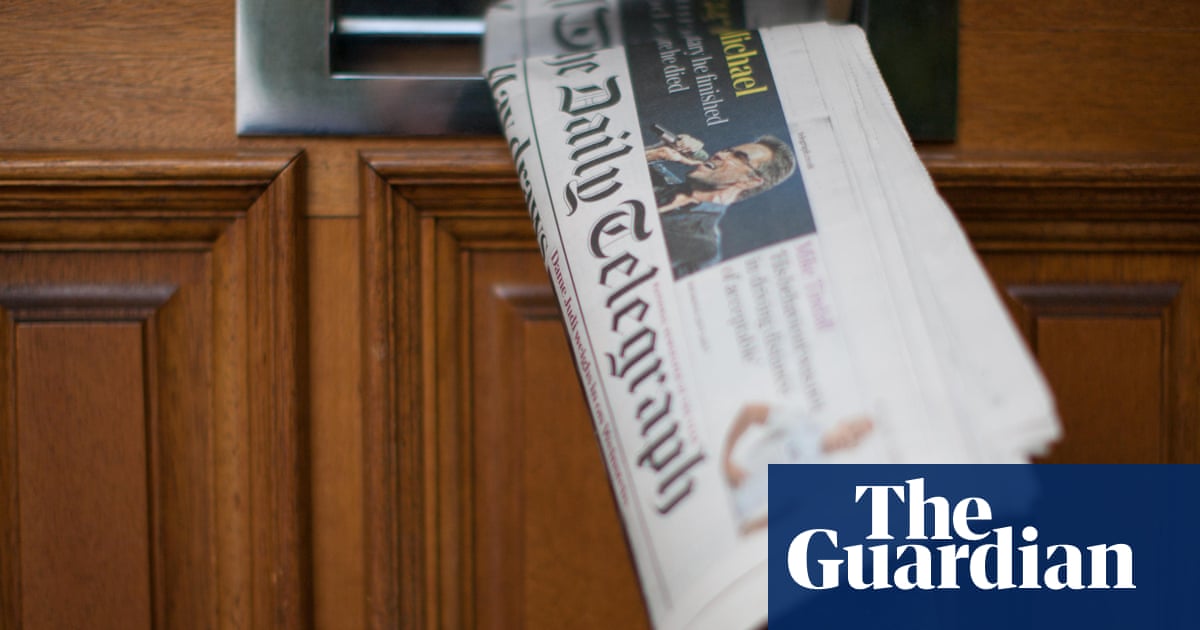A delegation from theUnited Arab Emiratesmet Downing Street officials weeks before ministers announced a law change that allows the state to take a 15% stake in the Telegraph titles, the Guardian understands.
Ministersdisclosed the cap this weekas part of a long-awaited clarification on the rules around state ownership of British newspapers. It is higher than the 5%-10% ceiling envisaged by the previous Conservative government.
It has now emerged that a few weeks earlier in March, a senior Emirati delegation held a meeting in No 10 with officials including Varun Chandra, the business adviser to Keir Starmer. While details of the meeting are unknown, it is understood the delegation sought clarity on the state ownership law.
The move in effect paves the way for the UAE to take a 15% stake in the Telegraph, most likely through the IMI investment vehicle backed by Abu Dhabi. Downing Street and IMI declined to comment. The Abu Dhabi government has been approached for comment.
The law change ends a lengthy consultation involving intensive lobbying by newspaper owners. It is also a sign of Downing Street’s desperate search for economic growth and determination to make the UK an attractive place for overseas investment. However, the decision has been criticised by MPs and industry figures for opening up the British media to more state ownership.
Fraser Nelson, a former editor of the Spectator and current Times columnist, described the decision as an “indefensible sellout, in defiance of parliament’s vote to protect press freedom”. Andrew Neil, a former Sunday Times editor, said Lisa Nandy should lose her job as the culture, media and sport secretary over the decision.
The Liberal Democrats also oppose the new law and will launch an attempt to block it in the House of Lords with a “fatal motion”. The tactic is likely to split the Conservative party. Max Wilkinson, the Lib Dem culture spokesperson, said the proposed law put editorial independence “at risk”.
“It’s a plan we wholeheartedly reject,” he said. “No 10 must come clean on their meeting with UAE delegates, and clarify whether they were lobbied to roll back on what parliament agreed last year.”
Should the law change go through as expected, it marks the beginning of the end for the Telegraph’s ownership saga, which has rumbled on for two years. The Telegraph titles were originally bought by RedBird IMI, a UAE-backed venture that was blocked from taking control by the last government.
Under the new law, RedBird Capital, a US private equity firm, is expected to buy the Telegraph, with 15% of the money coming from IMI, which is linked to Sheikh Mansour bin Zayed Al Nahyan, the Emirati royal.
RedBird is also said to be talking to other possible British investors in the deal. A mooted attempt to buy the Telegraph by the Chelsea FC owner and chair, Todd Boehly, and the Fleet Street veteranDavid Montgomeryhas not materialised.
While there has been significant interest in the Telegraph from other groups, the asking price of £500m has proved too high for most. In 2023, Lord Rothermere’s Daily Mail and General Trust had been involved in talks with Qatari investors over a potential bid, but subsequently pulled out. However, the peer still has contacts in the region.
This week, Rothermere was among the high-profile media figures spotted in Doha meeting the US president, Donald Trump, and the Qatari emir, Tamim bin Hamad Al Thani. His group’s events business is understood to be prominent in the region. Others in the party included Piers Morgan, who owns and runs his own YouTube channel, and Patrick Soon-Shiong, the medical investor and Los Angeles Times owner.
Industry sources said the UAE delegation was not the only group to have been seeking clarity on the laws around media ownership by foreign states. Other media groups were said to have concerns over a ban on state ownership, or a very low ceiling on such ownership.
It is a sign of the financial strains in the media industry, as print sales decline and the digital revolution has brought huge change, with previously different kinds of media groups now competing with each other online. The development of AI is also seen as an opportunity as well as a threat by media executives, and the Gulf states have significant money to invest.
